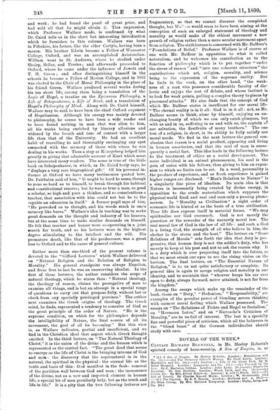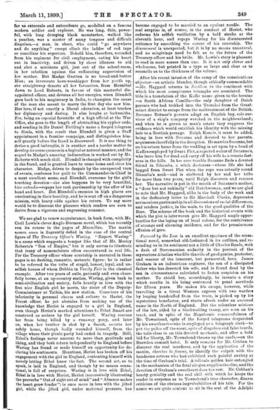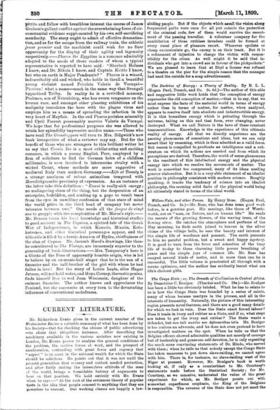NOVELS OF THE WEEK.* CAPTAIN RICHARD BLUNDELL, in Mr. Morley
Roberts's spirited comedy of hero-worship, A Son of Empire, is, so
• (1.) A Son of Empire. By Morley Roberts. London : Hutchinson and Co. [6s.]—(2.) The Treasury Officer's Wooing. By Cecil Lewis. London : Macmillan and Co. [6s.)—(3.) Swallow : a Tale of the Great Trek. By H. Rider Haggard. London; Longinsns and Co. [68.1—(4.) Pursued by the Law. By J. Maclaren Cobban. London : John Lonir. [6..)—(a.) Pharos the Egyptian. By Guy Boothby. London : Ward. Lock, and Co. 165.1--(8.) Cousin Ivo. By Mrs. Alfred lilidgwick. London : A. and (7. Black. 08.1-174 Life at Twenty. By Charles Russell Morse. London, W. Beinemann. (6s.] —(8 ) The Camino. By E. F. Benson. London : Methuen and o. (65.1- (9.) Hoya Corm. By Mrs. Bertram Tanquersy. Londog ; Digby„ Loug, and Oo. 06.1
far as eiternals and antecedents go, modelled on a famous modern soldier and explorer. F(e was long, thin, power- ful, with long drooping black moustaches, walked like a panther, was a master of many tongues and difficult
disguises,—a man, in short, who could "go anywhere and do anything" except climb the ladder of red tape or conciliate his superiors. Behold him, therefore, seconded from his regiment for civil employment, eating his heart Out in inactivity, and driven by sheer idleness to aid and abet a mutinous girl, just out of the school-room, in her rebellion against the suffocating supervision of her mother. But Madge Gretton is no bread-and-butter Miss ; an inveterate hero-worshipper from her youth up, she straightway deserts all her favourites, from Hannibal down to Lord Roberts, in favour of this masterful dis- appointed officer, and devotes all her energies, when Blundell goes back to his magistracy in India, to champion the cause of the man she meant to marry the first day she saw him. Her love, if not exactly a liberal education, at least teaches her diplomacy and daring. It also laughs at locksmiths. For, being an especial favourite of a high official at the War Office, she goes to the length of abstracting his cypher code, and sending in Sir Daniel Fielding's name a forged telegram to Simla, with the result that Blundell is given a Staff appointment in a frontier campaign, and distinguishes him- self greatly before the fraud is discovered. It is one thing to devise a good imbroglio, it is another and a harder matter to develop its consequences in a logical or natural manner, and the sequel to Madge's amazing indiscretion is worked out by Mr. Roberts with much skill. Blundell is charged with complicity in the fraud, and is granted leave to come home and clear his character. Madge, driven to despair by the unexpected turn of events, confesses her guilt to the Commander-in-Chief in a most excellent scene, and Blundell, overcome by the girl's touching devotion—she also happens to be very beautiful, bien entendu—repays her rash partisanship by the offer of his hand and heart. But Blundell's enemies in high places are unrelenting in their hostility, and be is sent off on a dangerous mission, with heavy odds against his return. To say more would be to discount the pleasure which readers are sure to derive from a vigorous and engrossing romance.
We are glad to renew acquaintance, in book form, with Mr. Cecil Lowis's clever Anglo-Burmese novel, which has recently run its course in the pages of Macmillan. The maxim women omen is flagrantly defied in the case of the central figure of The Treasury Officer's Wooing. " Rupert Waring" is a name which suggests a temper like that of Mr. Morley Roberts's "Son of Empire," but it only serves to illustrate that irony of nomenclature often encountered its real life. For the Treasury officer whose courtship is narrated in these pages is no dashing, romantic, meteoric figure: he is rather to be referred to the tribe of stupid, honest, loyal, and un- selfish heroes of whom Dobbin in Vanity Fair is the classical example. After two years of exile, patiently and even cheer- fully borne, at an up-country station, Waring, given back to semi-civilisation and society, falls heavily in love with the first nice English girl he meets, the sister of the Deputy. Commissioner at Tatkin, his new station. Conscious of his inferiority in personal charm and culture to Heriot, the Forest officer, he yet abstains from making use of the knowledge that Heriot is engaged to a girl in England, even though Heriot's marked attentions to Ethel Smart are construed as serious by the girl herself. Waring rescues her from being killed by a runaway pony, and later on, when her brother is shot by a dacoit, escorts her safely home, though badly wounded himself, from the village where their picnic party had ended in tragedy. Still, Ethers feelings never amount to more than gratitude and liking, and they both return independently to England before Waring has found or made himself an opportunity for de- claring his sentiments. Meantime, Heriot has broken off his engagement with the girl in England, contenting himself with merely letting Ethel know the fact. The second act, so to speak, is laid in England, and though by no means sensa- tional, is full of surprises. Waring is in love with Ethel, Ethel is in love with Heriot, Heriot (successively illustrating the proverbs" Out of sight out of mind" and "Absence makes the heart grow fonder ") is once more in love with the jilted girl, while the jilted girl, under maternal pressure, has become engaged to be married to an opulent noodle. The real surprise is, of course, in the conduct of Heriot, who redeems his selfish vacillation by a bold stroke at the eleventh hour, and repays Waring for his disinterested reticence by smoothing the course of his courtship. The denouement is unexpected, but it is by no means unnatural, and no misgivings need be felt as to the future of the Treasury-officer and his bride. Mr. Lowitt's story is pleasant to read in more senses than one. It is not only clever and wholesome, but printed in a type so large and clear as to reconcile us to the thickness of the volume.
After his recent invasion of the camp of the conscientious objector—an artistic blunder, though ethically commendable —Mr. Haggard returns in Swallow to the continent with which his most conspicuous triumphs are associated. The title is a translation of the Kaffir name given to the heroine —a South African Camilla—the only daughter of Dutch parents who had trekked into the Transkei from the Graaf- reinet district to escape from the maltreatment of the British. Suzanne Botmar's parents adopt an English boy, sole sur- vivor of a ship's company wrecked in the neighbourhood ; and when he is grown to man's estate they suppress the evidence which would establish his identity with the missing heir to a Scottish peerage. Ralph Kenzie, it must be added, being in love with Suzanne and devoted to her parents, acquiesces cheerfully in the deception. He marries Suzanne, but on hie return home from the wedding is set upon by a band of Kaffirs employed by Swart Piet, a rejected suitor of Suzanne's, 'who leave him for dead and carry off his wife to a remote fast- ness in the hills. In her sore trouble Suzanne finds a devoted friend in Sihatnba, a witch doctoress—whose life she had begged from Swart Piet when the rope was actually round Sihamba's neck—and is sheltered by her and her tribe for more than two years, until Ralph discovers and rescues her. The narrative is put in the mouth of Suzanne's mother, a "dour but not unkindly" old Dutchwoman, and we are glad to note that Mr. Haggard, alike in the body of the work and in the dedicatory letter to Sir Marshall Clarke, deprecates acrimonious partisanship in all discussions of racial differences, and renders justice, in the main, to the good qualities of the Boer. The scheme of the book and the historical events with which the plot is interwoven give Mr. Haggard ample oppor- tunities for the laying on of local colour, for the contrivance of strange and alarming incidents, and for the promiscuous effusion of gore.
Pursued by the Law is an excellent specimen of the sensa- tional novel, somewhat old-fashioned in its outlines, and re- minding us in its sentiment not a little of Charles Reade, with a dash of Stevensonian audacity in the portrait of the mysterious Alsatian who fills the role of good genius, protector, and rescuer of the innocent, but persecuted, hero. James Graham is an industrious engineer, the son of a dissipated father who has deserted his wife, and is found dead by the son in circumstances calculated to fasten suspicion on his mother. To shield her, accordingly, he invents a story which results in his being sentenced to penal servitude for fifteen years. He makes his escape, however, while travelling in a Great Western express with two warders by leaping handcuffed from the train, is picked up by his mysterious benefactor, and starts afresh under an assumed name in the North of England. But the relentless minions of the law, aided by a blackmailing tramp, are soon on his track, and in spite of the Napoleonic resourcefulness of Mr. Townsbend, spite of the forged telegrams despatched by his sweetheart—who is employed as a telegraph clerk—to put the police off the scent, spite of disguises and false beards, the toils close in on this devoted mechanic, and after a bold bid for liberty, Mr. Townshend throws up the cards,—on the Snowdon summit hotel. It only remains for Mr. Cobban to discover the real murderer, and by the application of the maxim, cherchez la femme, to identify the culprit with the handsome actress who had exhibited such painful anxiety at the time of Graham's trial. A tell-tale golden hair entangled in the mechanism of the fatal air-gun supplies the clue, and the devotion of Graham's sweetheart does the rest. Mr. Cobban's hearty geniality and the real skill with which he keeps the reader in suspense as to Townshend's true character, disarm criticism of the obvious improbabilities of his tale. For the nonce we are quite content to sit in the seat of the Adelphi pittite and follow with breathless interest the course of James Graham's gallant conflict against the overwhelming force of cir- cumstantial evidence supplemented by his own self-sacrificing mendacity. The story ought to admit of effective dramatisa- tion, and as for the escape from the railway train, the athletic jeune premier and the machinist could wish for no finer opportunity for the display of their agility and ingenuity respectively.—Pharos the Egyptian is a romance admirably adapted to the needs of those readers of whom a typical representative is reported to have said : "Sherlock Holmes I know, and Dr. Nikola I know, and Captain Kettle I know, but who on earth is Major Pendennis? " Pharos is a wizard, indescribably old and wicked, who holds in thrall a beautiful young violinist named Friialein Valerie de Vocxqal- Pka-ebus : what a name—much in the same way that Svengali hypnotised Trilby. In reality he is a revivified mummy, Ptahmes, son of Netruhotep, who has sworn vengeance on the human race, and amongst other pleasing exhibitions of his malignity inoculates the hero with the plague virus and employs him as a means of spreading the infection in the very heart of Mayfair. In the end Pharos perishes miserably and Cyril Forrest presumably marries Valerie de Vocxqal. We hope that for professional purposes she was allowed to retain her splendidly impressive maiden name.—Those who have read The Grasshoppers will turn to Mrs. Sidgwick's new book irrespective of what a reviewer may say. But for the benefit of those who are strangers to this brilliant writer let us say that Cousin Ivo is a most exhilar ating and exciting romance, in which a young English Peer, employed by a firm of solicitors to find the German heirs of a childless millionaire, is soon involved in internecine rivalry with a wicked Count, whose methods are more suggestive of medimval Italy than modern Germany.—Life at Twenty is a strange amalgam of robust animalism tempered with Meredithyrambic preciosity of expression. As an instance of the latter take this definition : "Ennui is really-sick energy ; no malingering sham of the thing, but the desperation of an enterprise, bedridden, and sending up a gape to vomit tears from the eyes in unwilling confession of that state of mind the world pities in the third head of company but never tolerates between two." One needs all the fougue de vingt ans to grapple with the complexities of Mr. Morse's style.— Mr. Benson turns his loc l knowledge and historical studies to good account in The Capsina, a spirited tale of the Greek War of Independence, in which Kanaris, Miaulis, Kolo- kotrones, and other historical personages appear, and the title-role is filled by a heroic Amazon of Hydra, chieftainess of the clan of Capsas. Mr. Jacomb Hood's drawings, like those he contributed to The Vintage, are immensely superior to the generality of book-illustrations.—Mrs. Tanqueray's hero is a Giotto of the Fens of apparently humble origin, who is led to believe by an ex-music-hall singer that he is the son of a financier and the half-brother of the girl with whom he had fallen in love But the story of Lottie Lepla, alias Hagar Jetsam, will not hold water, and lioya Corney, the rustic genius, finds himself free to wed Joan Wisconsin, daughter of the eminent financier. The author knows and appreciates the Fenland, but she succumbs at every turn to the devastating influences of conventional melodrama.








































 Previous page
Previous page